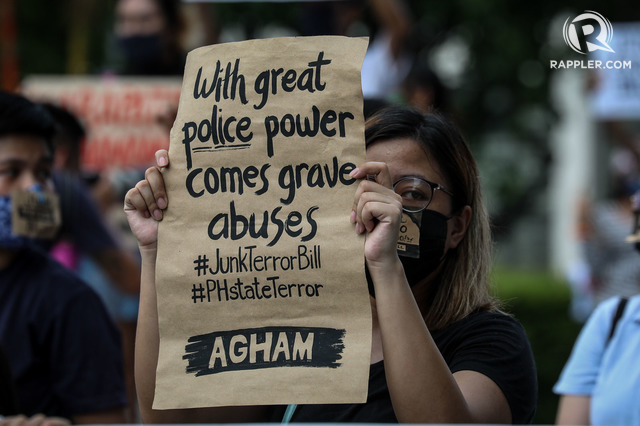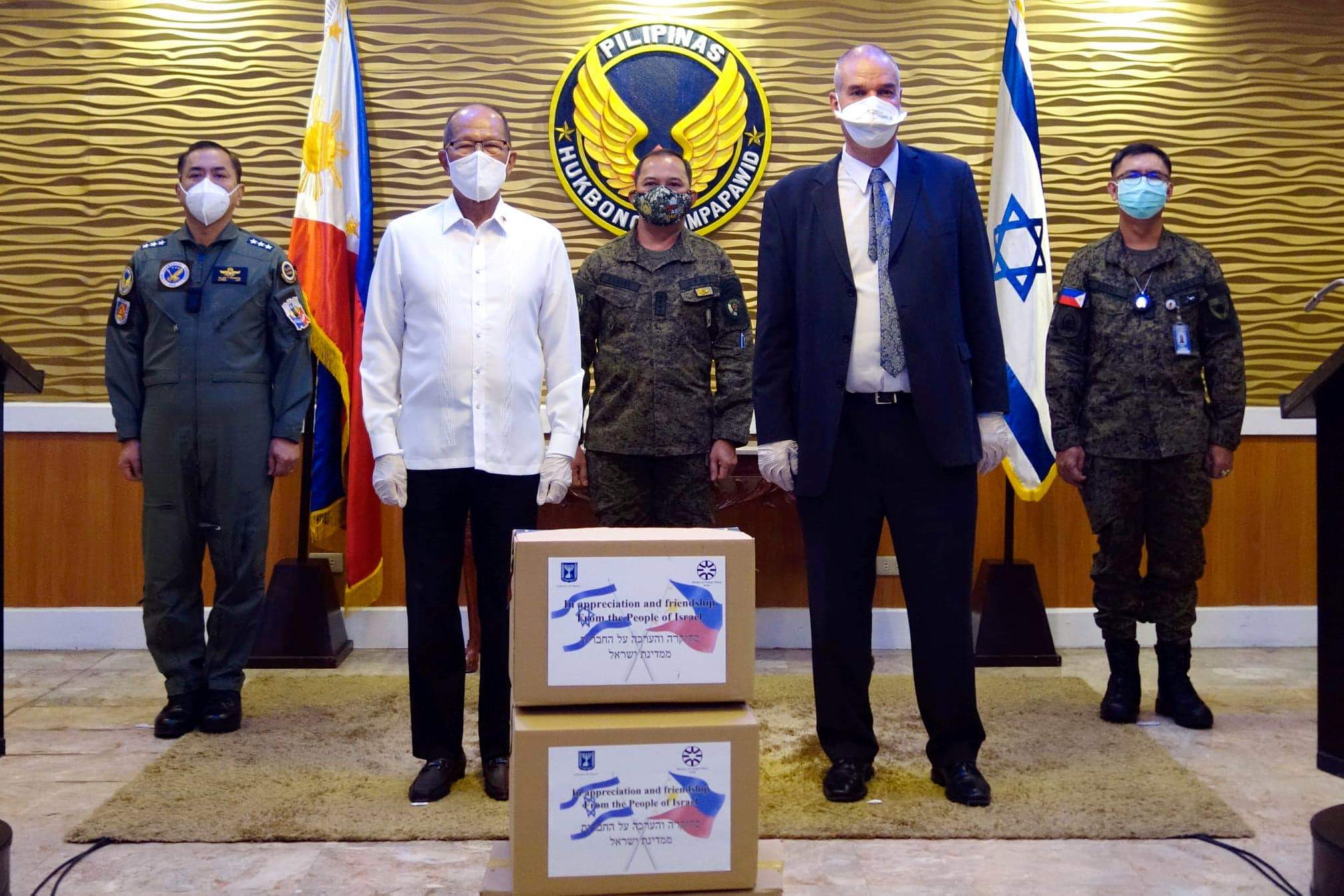The fear of using the anti-terrorism bill as an avenue for red-tagging the opposition and progressive groups is “unfounded”, Malacañang said on Wednesday.
Presidential Spokesperson Harry Roque emphasized that it was wrong for critics of the measure to make this conclusion since there still has to be a “judicial declaration” for a group to be considered as a communist organization.
“Red-tagging by just referring you as a communist group will not have any legal effect unless a court has declared you to be a terrorist organization,” Roque said in an interview over ABS-CBN News Channel’s Headstart.
Although courts can theoretically declare them as communist organizations, Roque said “there’s some kind of an impossibility” because it is not clear where the summons would be served.
“I guess it’s an unfounded fear because lawyers, at least those who know how the rules of court operate, know that even if we want to give the courts the power to declare a terrorist organization, there will be some difficulty particularly in acquiring jurisdiction over the persons of that alleged terrorist organization,” he said.
No warrantless arrestsRoque, a human rights advocate, dismissed the statement made by lawyer Chel Diokno, chairman of the Free Legal Assistance Group, that the legislation would allow warrantless arrests based on mere suspicion.
“No. Don’t think the law can amend the rules of court which is the exclusive jurisdiction of the courts. That’s in the Constitution as well. I think we have to study the basics of constitutional law before we conclude. We need to distinguish between statements that politicians would make against the administration from the actual facts,” he said.
Roque said that if there were questions about the constitutionality of the law, critics can challenge them before the courts.
He belittled efforts done by the opposition to challenge acts done by the Duterte administration before the courts.
“Look at the track record of these people challenging acts done by the Duterte administration, zero. When I was at my prime, my peak, in challenging acts of other administrations, I went to court and got the judgments that I wanted. So we should focus on actually revisiting how to actually go about constitutional litigation if we feel that there are really unconstitutional provisions in the law,” he said.
Roque allayed fears that the act of terrorism could be determined by the police.
“That’s not accurate. In fact, I argued the case of David vs. Arroyo where we partially were successful in declaring an act of then-President Gloria Macapagal-Arroyo as being unconstitutional because there was no definition of terrorism,” he said.
Roque was referring to the warrantless arrest and detention of columnist Randy David and Ronald Llamas, and the warrantless search of the Daily Tribune’s premises where the definition of terrorism was left to the law enforcement authorities.
“It is not accurate anymore that it is the police who will define. There’s sufficient definition now given in the statute as well as in the UN community itself because it has been an issue that the UN system grappled with for many, many years. And there’s now at least a compromise that if we can’t define it with precision then we know the effects that the states have the right to curtail,” he said.
Despite the lack of definition of terrorism, Roque said there is at least a consensus on what is the effect of terrorism that states can curtail and this is to instill fear or terror in the minds of the general public through overt acts by terrorists or terrorist groups.
Protected by ConstitutionIn case the proposed anti-terrorism law is misused, Roque said that there were “judicial remedies” such as filing a writ of Amparo which is a remedy available to “any person whose right to life, liberty, and security is violated or threatened with violation by an unlawful act or omission of a public official or employee, or of a private individual or entity”.
“The difference is when HSA (Human Security Act) was first passed, we did not have institutional safeguards initiated by the Supreme Court yet to protect the right to life which we do have now,” he said.
To allay concerns that persons posting anti-government sentiments on social media would be considered as a terrorist and could be arrested, Roque also explained the importance of the right to freedom of expression in the1987 Constitution.
“Despite the law, the Constitution remains as the fundamental guarantee of freedom of expression,” he said.
Protests and strikes, Roque said, are also protected by the Constitution.
“The right to strike is again protected by the Constitution. Remember that the operative definition of [terrorism] is to instill fear or terror in the minds of the general public. So unless they can show that this strike instills that kind of fear or terror which amounts to a clear and present danger, it cannot be suppressed,” Roque said.
Roque said that if arrests of persons posting on social media and joining rallies would infringe the minimum standards set by the bill of rights, it will be declared unconstitutional by the courts.
Timing not offAmid questions raised on the timing of the decision of President Rodrigo Duterte to certify the bill as urgent while the country grapples the coronavirus disease (Covid-19) health crisis, Roque explained that the measure would help put an end to the “never-ending” cycle of attacks launched by communist rebels against government troops and civilians.
“I don't think the timing is off because Marawi is still being rebuilt so the aftershocks of modern-day terrorism are still being felt in Marawi. And of course, the Sulu attack happened. You saw how gruesome that murder of our soldiers was. I don’t think it is something that just cropped out. It’s a problem that we have perennially faced,” he said.
Since the Marawi siege took place in 2017, Roque pointed out that there have only been two convictions under the Human Security Act but the threat of terrorism still remained.
“We saw that there was an attack again in Sulu perpetrated by the Abu Sayyaf and that it's a never-ending cycle. So clearly what this has shown that with only two convictions under the Human Security Act, no complaints filed so far from the enforcement of the Human Security Act, we need to strengthen the anti-terrorism legislation,” he said.
Roque, a former law professor, also explained that compared to anti-terrorism laws in other countries such as the US, the UK, and Australia, the Philippines’ existing Human Security Act was “tame” and the “weakest link”.
“In fairness, as an academic, we have had the opportunity to compare our own Human Security Act with the different anti-terror legislation in countries such as the UK, Australia, and even the US and ours clearly lacked the teeth that are required given the current face of international terrorism,” he said.
Under the anti-terrorism bill, persons who voluntarily and knowingly join any organization, association, or group of persons knowing that such is a terrorist organization, shall suffer imprisonment of 12 years.
Suspected persons can be detained for 14 days without a warrant of arrest with an allowable 10-day extension. A 60-day surveillance on suspected terrorists can also be conducted by the police or the military, with an allowable 30-day extension.
The use of videoconferencing for the accused and witnesses will also be allowed under the measure.
The Commission on Human Rights will be notified in case of detention of a suspected terrorist.
https://www.pna.gov.ph/articles/1104752




















